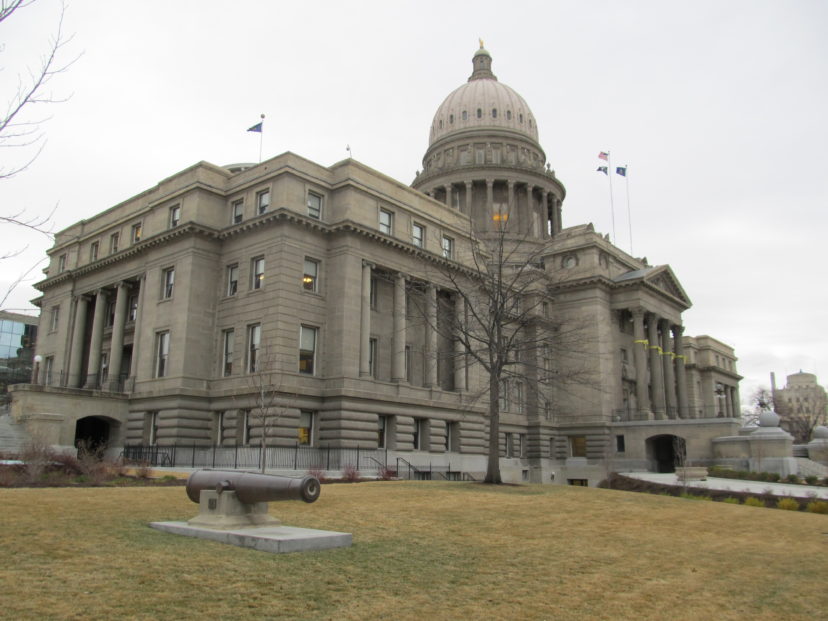It was an historic first.
On March 20, Idaho legislators heard a public presentation from supporters of an amendment to the Idaho Human Rights Act to include the words “sexual orientation” and “gender identity or expression.”
The hour-long presentation and questions and answers period, delivered during a joint session of the State Senate and House Affairs committees, drew a packed crowd of about 300 at the Idaho State Capitol Building. It was the first opportunity for legislators to hear directly from community proponents of the amendment, following years of legislative inaction on the issue. Neither a print nor a public hearing of an amendment bill is expected this year.
Senator Cheri Buckner-Webb and Representative Grant Burgoyne worked with Idaho LGBTQ community advocates to organize the presentation, which brought together an array of perspectives to help inform legislators of the necessity for the amendment.
Pride Foundation Executive Director Kris Hermanns wrote a letter in favor of the amendment that was included in an informational packet for committee members.
“Adding ‘sexual orientation, gender identity or expression’ to the list of groups protected under state laws not only addresses the discrimination faced by LGBT Idahoans,” Hermanns said, “but it is good for all Idaho citizens and builds on our values of fairness and freedom.”
Don Curtis Sr., a retired Hewlett-Packard general manager in Boise, talked to the committees about how what you do as a leader influences the actions of those around you, referring to HP’s inclusion of non-discrimination protections for its LGBTQ employees, enacted before his retirement.
“The rollout went extremely smoothly because HP leaders said ‘we’ll be the example and treat everyone with dignity and respect,’” Curtis said. “And that change did help us with recruiting employees.”
One of those recruits was Curtis’ own openly gay son, who Curtis said also helped him in his own personal growth regarding LGBTQ issues.
“I was conveniently blinded to think that everyone is heterosexual, and I was a believer in the myth of homosexual choice,” he said. “I asked a lot of questions and finally put that myth behind me. We all have to honestly confront the myth and see the biases and prejudices that we have.”
Clark Krause, executive director for Boise Valley Economic Partnership, helps keep and grow jobs in Idaho as his main BVEP role and recruits companies to relocate to the state. He told the committees that questions about diversity and inclusiveness often arise.
“We compete nationally for businesses to come here, and clients and employees want to feel comfortable and welcome in your community,” Krause said. “Discrimination is just bad for business.”
Mistie Tolman, spokesperson for Add the Words Idaho and a Pride Foundation 2012 scholar, talked about a job she once had where she felt the need to hide her sexual orientation as a lesbian, sidestep questions about her personal life, and not put a photo of her partner on her desk.
“I had no protections and I was very aware of it,” she said. “Gay and transgendered Idahoans live as second-class citizens. No one should have to live in daily fear of being fired.”
Boise Police Chief Michael Masterson echoed Tolman’s statements, adding that police departments can’t do their jobs effectively if citizens don’t trust them. The City of Boise enacted a citywide nondiscrimination ordinance in January with protections for sexual orientation and gender identity/expression in housing, employment and public accommodations, and the police department now employs an LGBT liaison officer – the first and only one in Idaho.
“Our job is jeopardized when citizens feel we can’t protect them,” Masterson said. “LGBT crimes go unreported. People are afraid to report them for fear of being outed and jeopardizing their employment.”
Monica Hopkins, executive director of the American Civil Liberties Union of Idaho, summed up the presentation succinctly when asked to clarify whether the amendment was about giving LGBTQ citizens “special rights.”
“We all have a sexual orientation and a gender identity,” she said. “This amendment is about upholding equal rights.”
Steve Martin is Pride Foundation’s Regional Development Organizer in Idaho. Email Steve.
